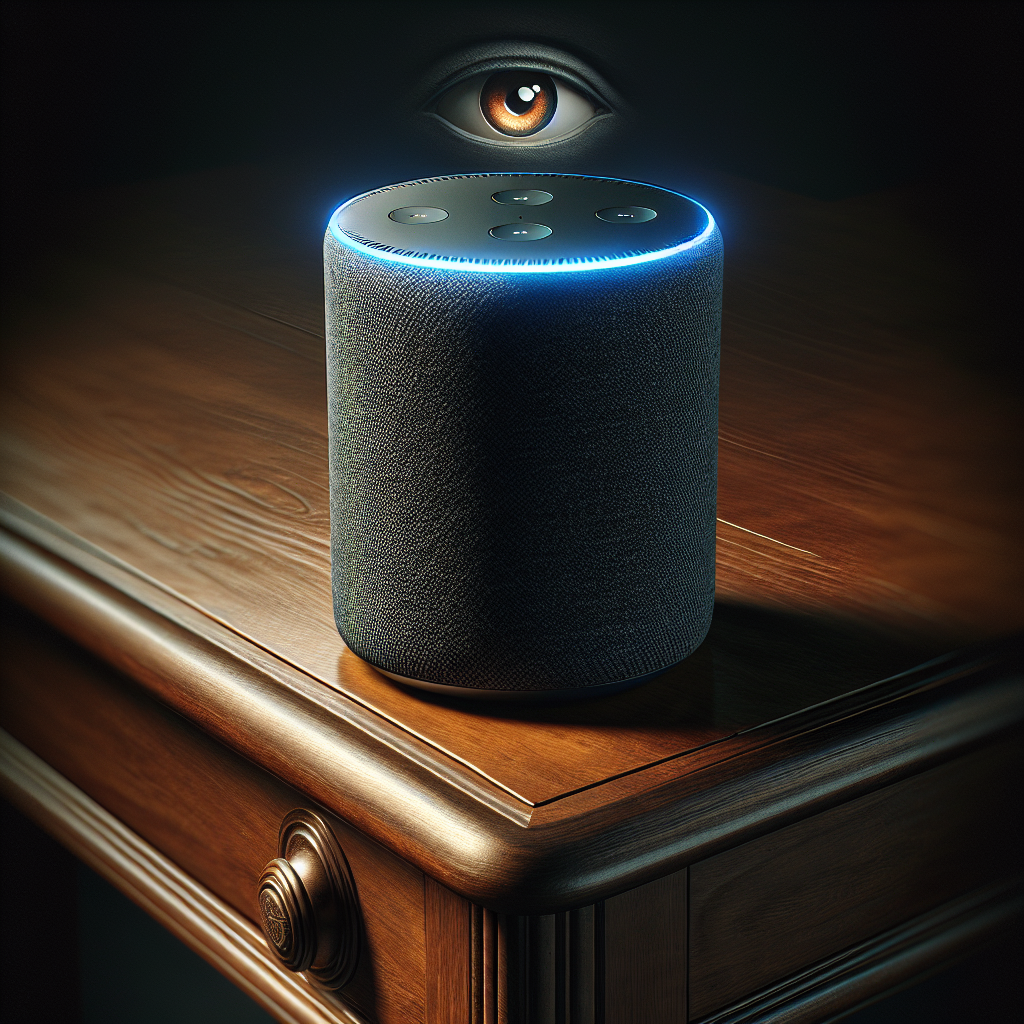Imagine you’re sitting in your living room, casually talking with a friend about your weekend plans, when suddenly your voice-controlled smart speaker bursts into life, chiming in with unsolicited suggestions and advertisements. As convenient as these devices may be, there are growing concerns about privacy and data security. In this article, we’ll explore the potential privacy risks associated with voice-controlled smart speakers, and offer some tips on how to protect your personal information in this ever-connected world. So, grab a cup of tea and join us as we navigate the murky waters of privacy concerns with these seemingly innocent devices.

Types of voice-controlled smart speakers
Amazon Echo
Amazon Echo is a popular voice-controlled smart speaker developed by Amazon. It is powered by the virtual assistant Alexa, which responds to voice commands and performs tasks such as playing music, setting reminders, and controlling smart home devices. The Echo devices come in various models and have become a staple in many households for their convenience and functionality.
Google Home
Google Home is another leading voice-controlled smart speaker that utilizes the Google Assistant. This device is capable of providing information, playing music, and controlling compatible smart home devices through voice commands. Google Home comes in different sizes and designs, offering options to fit the diverse needs and preferences of users.
Apple HomePod
Apple HomePod is a high-end smart speaker that integrates with the Apple ecosystem. It uses the virtual assistant Siri to carry out tasks and respond to user queries. HomePod boasts impressive audio quality and is designed to provide a seamless experience for Apple users. While relatively new to the market, it has gained popularity among Apple enthusiasts.
Collection and storage of personal data
Microphone always on
One of the privacy concerns surrounding voice-controlled smart speakers is the fact that the device’s microphone is always on. While this is necessary for the device to listen for the wake word or command, it raises concerns about unintentional recordings and potential invasion of privacy. However, it is important to note that the audio data is typically processed locally on the device and only sent to the cloud after the wake word is detected.
Recording and storing voice commands
Voice-controlled smart speakers record and store voice commands to improve their performance and provide personalized experiences. These voice recordings are usually stored on the cloud servers of the respective companies. While the purpose is to enhance the accuracy and efficiency of the virtual assistant, it raises questions about the security and privacy of such data.
Importance of user consent
To address privacy concerns, companies have emphasized the importance of obtaining user consent before collecting and using voice data. User consent is typically sought during the initial setup process, where individuals are informed about the data collection practices and given the opportunity to review and agree to the terms and conditions. This ensures that individuals are aware of how their data will be used and allows them to make an informed decision.
Data retention policies
Another aspect of privacy consideration is the data retention policies implemented by smart speaker manufacturers. Companies should have clear guidelines on how long they retain user voice recordings and should provide options for users to delete their data if desired. Transparent data retention policies are essential to safeguard user privacy and maintain trust in the product.

Potential privacy risks
Unauthorized access to personal information
One of the primary concerns with voice-controlled smart speakers is the potential for unauthorized access to personal information. As these devices are constantly listening, there is a risk of unintended recordings capturing sensitive conversations or personal details. Unauthorized access to these recordings could lead to privacy breaches and compromise the security of individuals’ personal information.
Data breaches
Data breaches pose a significant privacy risk for users of voice-controlled smart speakers. If the cloud servers storing voice recordings are compromised, it could result in unauthorized access to sensitive user data. This could include personal conversations, private information, or even login credentials if used in proximity to the smart speaker. To mitigate this risk, companies must invest in robust security measures to protect user data from cyberattacks.
Third-party access to data
Voice-controlled smart speakers often integrate with third-party services and applications to expand their functionality. While this enhances user experience, it also raises concerns about the sharing of personal data with these external entities. It is crucial for users to be aware of the privacy policies and data sharing practices of both the smart speaker manufacturer and any connected third parties to make informed decisions about their privacy.
Voice recordings used for targeted advertising
There is a concern that voice recordings captured by smart speakers could be used for targeted advertising purposes. While companies have claimed that they do not use voice data for advertising, the potential to analyze voice commands and preferences to deliver personalized ads exists. It is important for users to understand how their voice data is used and have the ability to opt-out of any marketing activities they are uncomfortable with.
Security measures implemented
Encryption of voice recordings
To ensure the security of user data, smart speaker manufacturers implement encryption protocols for voice recordings. This means that the recordings are scrambled in a way that makes them unreadable without the appropriate decryption key. Encryption adds an additional layer of protection, making it harder for unauthorized individuals to access and understand the content of the voice recordings.
Multi-factor authentication
Multi-factor authentication is a security measure implemented to prevent unauthorized access to smart speaker accounts. By requiring users to provide multiple forms of verification, such as a password and a unique code sent to their mobile device, it adds an extra layer of protection against unauthorized access. This helps to ensure that only authorized individuals can control the smart speaker and access associated data.
Permission-based access to data
Smart speakers often provide users with the ability to grant or restrict access to personal data. This permission-based access control allows individuals to decide which applications, services, or third parties can access their data. By having control over the data shared and limiting access to trusted entities, users can better protect their privacy and minimize potential risks.

User control and transparency
Access to voice recordings
Users should have transparent and easily accessible ways to view and manage their voice recordings. Smart speaker manufacturers should provide user-friendly interfaces or mobile applications that allow individuals to access and review their recorded voice commands. This level of transparency empowers users to monitor the data collected and ensures they have control over their own personal information.
Deleting voice recordings
One of the key privacy concerns is the ability to delete voice recordings. Users should have the option to delete their voice data whenever they choose. Implementing an easy-to-use voice recording deletion feature provides individuals with the necessary control over their data and allows them to exercise their right to privacy.
Privacy settings and customization options
Smart speaker manufacturers can enhance user privacy and control by providing customizable privacy settings. This could include options to limit data sharing with third parties, enable or disable certain features, or adjust the sensitivity of the device’s microphone. By giving users the ability to customize their privacy settings, individuals can tailor their experience to their specific privacy preferences.
Legal implications and compliance
Data protection laws
Smart speaker manufacturers must comply with relevant data protection laws that govern the collection, storage, and use of personal data. Companies must understand and adhere to regulations such as the General Data Protection Regulation (GDPR) in the European Union or the California Consumer Privacy Act (CCPA) in the United States. Compliance with these laws ensures that user data is handled responsibly and protects individuals’ privacy rights.
Regulatory compliance and standards
Smart speakers are subject to various regulatory requirements and industry standards to ensure the protection of user privacy. Manufacturers should adhere to standards set by organizations such as the International Electrotechnical Commission (IEC) or the National Institute of Standards and Technology (NIST). Compliance with these standards helps to maintain a high level of security and privacy in smart speaker technologies.

Case studies and controversies
Amazon Alexa recording and sharing conversations
In 2019, it was discovered that Amazon Alexa devices had recorded and shared conversations without user consent. The incident raised concerns about privacy and security, highlighting the potential risks associated with voice-controlled smart speakers. Following the controversy, Amazon implemented stricter privacy controls and offered improved transparency regarding data collection and usage to regain user trust.
Google Home accidentally recording conversations
There have been instances where Google Home devices accidentally recorded conversations without user activation or consent. These instances raised questions about the device’s constant listening capabilities and the potential for privacy breaches. Google has since made efforts to improve the accuracy of wake word detection and enhance privacy controls to minimize the occurrence of such incidents.
Consumer awareness and education
Educating users about privacy risks
It is essential to educate users about the privacy risks associated with voice-controlled smart speakers. Manufacturers should provide clear and concise information during the setup process on how data is collected, stored, and used. Additionally, ongoing awareness campaigns and educational materials can help users understand the potential privacy concerns and guide them in making informed decisions when using these devices.
Empowering users with privacy controls
To address privacy concerns, smart speaker manufacturers should develop user-friendly privacy control interfaces. These interfaces should enable individuals to easily customize their privacy settings, manage data access permissions, and delete voice recordings. Empowering users with these privacy controls puts them in charge of their own data, allowing them to make choices that align with their privacy preferences.
Best practices for using voice-controlled smart speakers
Educating consumers on best practices for using voice-controlled smart speakers is crucial. This includes advising users to regularly review privacy settings, change default passwords, and update firmware to ensure the latest security patches are implemented. Additionally, users should be encouraged to limit the sharing of sensitive information with their smart speakers and carefully consider the integration of third-party services.

Privacy concerns for vulnerable populations
Children’s privacy
Voice-controlled smart speakers raise particular concerns regarding children’s privacy. As these devices are often used by the whole family, it is essential to provide parental control features that allow parents to restrict access to certain functionalities or limit data collection for minors. Extra precautions should be taken to protect children’s privacy rights while still providing a valuable user experience.
Privacy risks for older adults
Older adults may face privacy risks when using voice-controlled smart speakers, as they may be more vulnerable to scams or privacy breaches. Companies should consider designing intuitive interfaces and providing detailed instructions to ensure that older adults can understand and manage their privacy settings effectively. By promoting user-friendly experiences, smart speaker manufacturers can ensure the privacy and security of all age groups.
Privacy concerns for individuals with disabilities
Individuals with disabilities who rely on voice-controlled smart speakers for accessibility may face unique privacy concerns. Manufacturers should take into account the specific needs and privacy requirements of this user group, such as providing enhanced privacy settings for sensitive information or prioritizing secure communications during voice command exchanges. By addressing the privacy concerns of individuals with disabilities, smart speaker technology can better serve all users inclusively.
Mitigating privacy concerns
Enhanced privacy settings
Smart speaker manufacturers should continuously enhance privacy settings, offering users greater control over their data. This could include features such as granular data sharing options, the ability to limit data retention periods, and an easily accessible privacy dashboard. By providing more extensive privacy settings, users can tailor their experience to their comfort level and mitigate privacy concerns.
Improved data encryption
To bolster user privacy, smart speaker manufacturers should invest in improved data encryption methods. This includes utilizing strong encryption algorithms that protect voice recordings during transmission and storage. Regularly updating encryption protocols and staying abreast of industry advancements can help ensure the highest level of data security.
Clear privacy policies and terms of service
Companies should provide clear and easily understandable privacy policies and terms of service to users of voice-controlled smart speakers. These policies should outline data collection practices, data retention periods, sharing practices, and any third-party partnerships. Transparent and concise privacy policies help users make informed decisions about their privacy and understand how their data is handled.
In conclusion, while voice-controlled smart speakers offer convenience and functionality, it is crucial to consider and address privacy concerns. The collection and storage of personal data, potential risks, security measures, user control and transparency, legal implications, and case studies all contribute to understanding and managing privacy considerations. By implementing robust security measures, providing user control and transparency, promoting consumer awareness, and addressing the privacy concerns of vulnerable populations, smart speaker manufacturers can cultivate trust and ensure the privacy and security of their users’ personal information.










